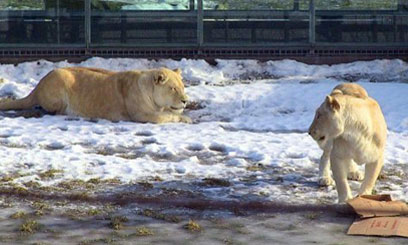The African carnivore has adapted well to Canada’s cold winters.
In a neighbouring paddock, a spotted hyena struggles to climb atop a wooden podium covered in ice and snow to reach her dinner – a slab of meat.
The 400-hectare (1,000 acre) Safari Park about 70 kilometres (43 miles) south of Montreal offers visitors an opportunity to see lions, hyenas, camels, elephants and 520 other animals – many of the species slowly disappearing from Africa’s wilds.
“Our goal is to sensitize people to the human overpopulation that is hurting spectacular or ferocious animals dying for lack of space or killed as humans invade their territories,” the private zoo’s owner, Jean-Pierre Ranger, told AFP.
Safari Park is closed in winter but many of its residents still come out of their heated cages to stretch and breathe some fresh air – even in the cold.
Many have adapted well to living in Canada and spend hours in the snow, said Sophie Robidoux, the park’s zoological director.
“We keep them inside if it’s really too cold, or if there’s a really big snowfall,” she says. “It becomes just too much work to get them out.”
The animals never catch a cold or suffer a sore throat. “We don’t need to give them antibiotics for respiration problems,” Robidoux adds. Of course, the question is not asked of the Siberian tigers. “They prefer winter. They don’t like summer.”
To reward the African animals and also to encourage behaviours that we might see in their natural environment, they are offered “enrichments” such as chunks of meat hidden in cardboard boxes placed in hard-to-reach places.
Relying on their sense of smell, jumping atop posts to reach treats and so on mimics actual foraging or hunting.
In the lion’s den, it is the male that serve himself first, or the most vigorous of the two lionesses. Over in the matriarchal hyena enclosure, the male cowers in a corner waiting for the females to finish eating.
Some of the zoo residents never go out in winter. Chimpanzees, for example, are deemed too fragile and are not even invited out. Elephants are also not well-adapted for Canadian winters, such as the park’s 40-year-old female named Churchill.
“She would be afraid of slipping and getting hurt,” says Francis Lavigne, who cares for the large pachyderm.
There is no obvious sign of cabin fever, however, in Churchill who adores human contact.
She accepts up to 50 orders in English such as “lift left leg” or “spin” that project a “Disney-esque” experience in the park that is “more play-land than pure zoo,” said Ranger.
Safari Park receives about 310,000 visitors each year, generating revenues of $8 million.
Ranger hopes to add an aquatic park, camping, and offer three or four day stays for up to 250 children to learn about the animals that could triple revenues.















































